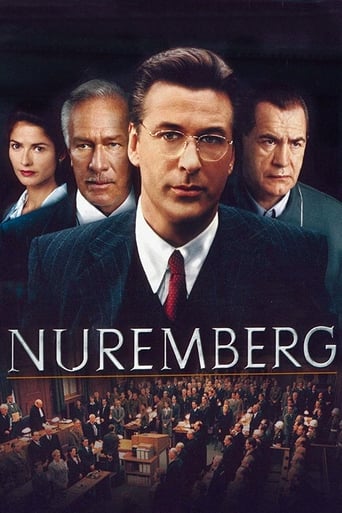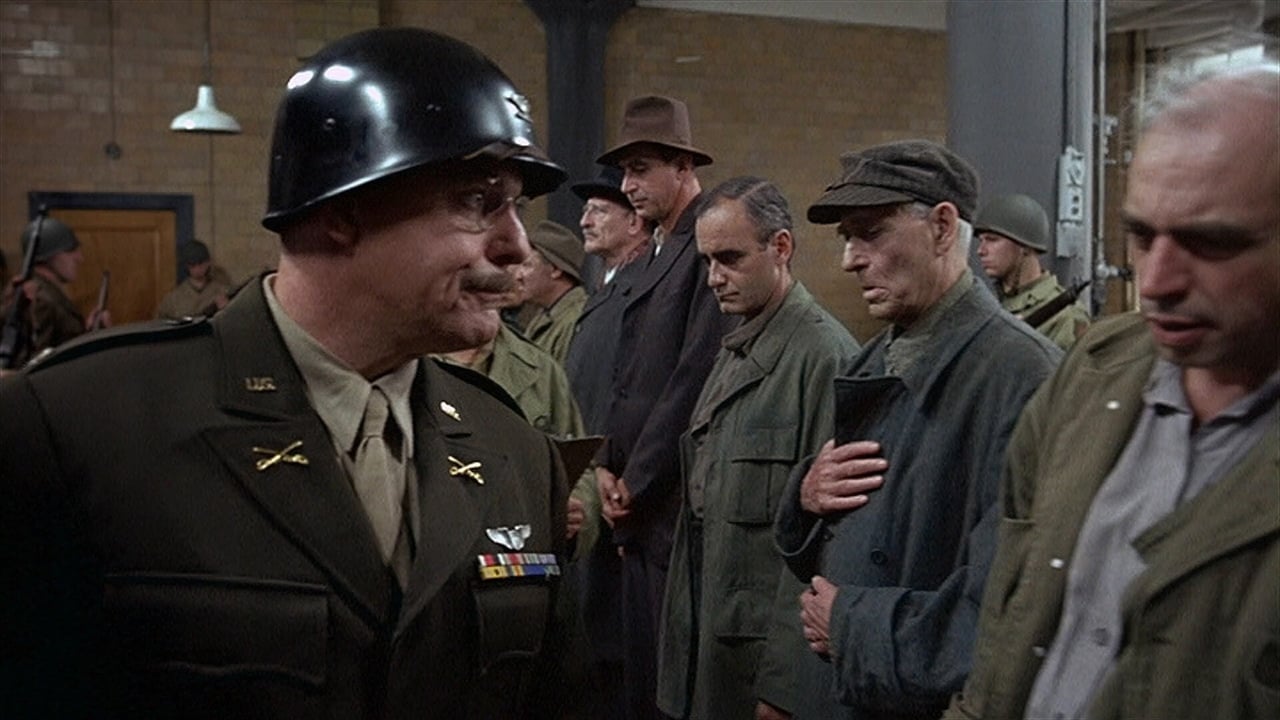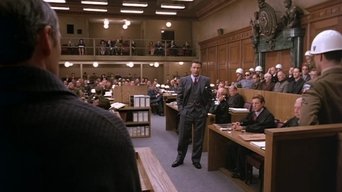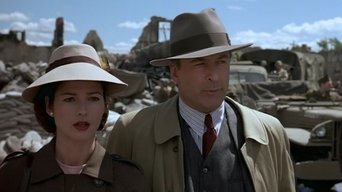amwcsu
From 1998 to the present the TNT network has made a series of well-acted films worthy of awards and praise from viewer and critic alike. Not many TV movies can make this claim. Nuremburg is one of these films.When someone says: "Made-for-TV" movie one would expect characters that are miscast at worst misplaced and numerous mistakes such as modern cars deep in the background, a cheaply made background. But Nuremburg shatters this common stereotype. The characters are 3 dimensional and worth remembering. Alec Baldwin's performance is a commanding and selfless figure...very reassuring almost to sickening levels. Christopher Plummer and Jill Hennessey are very inoffensive supporting cast. They aren't as motionless as the scenery. The most riveting performance aside from Baldwin's is Brain Cox's portrayal of Reichmarshall Hermann Goering is spot-on and very intellectual.The films also gets high marks not only for its moral message about justice and democracy. It gets high marks for one particular scene of the liberation of the Nazi concentration camps shown in very explicit and very painful detail. You would actually feel the shock and numbness of the audience. The oral testimony of the survivors also cannot be forgotten as it too explained the Nazi oppression in details just as painful. However, the Nazi officers standing trial remain either unmoved or motionless seeing their crimes from the opposite side of the law. Unfortunately, the accused only show a sliver of their humanity in the face of their ultimate fate: prison time or an execution.Now for the things I felt were lacking in this film, I didn't find that many. I don't hate this film but it's not on the level of the 1962 "Trial At Nuremberg". It should be a full-length silver screen modern adaptation. I didn't like the scenery that was obviously a CGI construct i.e. "the place of justice". There is a lot of emotions in this film like in the big-budget blockbuster. However, it's sanitized, too neat, and *ahem* not controversial enough. I prefer my docudramas with a little controversy albeit a safe dose. In conclusion, this is a wonderful film that is a little too clean and safe given this touchy subject. Nuremberg should be as intriguing as Conspiracy and moving as Schiendler's List. But it's one of the very few movies of 2000's that is my DVD pick and we can't have everything.
aphrodite_007
I'm a graduate student doing my thesis on the Nuremberg Trials and so for the past few months I've been immersed in the transcripts, diaries and all the different interpretations of the Trials. I think that the documentary is actually a very good representation of what happened. The most striking aspect of it was the visual side of things. The locations were perfect, with the reconstruction of a bombed-out Nuremberg as well as the courtroom being absolutely perfect. As well as this, the actors playing the defendants looked remarkably similar to their real life characters and had clearly studied their mannerisms and facial tics. Streicher's excessive chewing, Jodl's upright posture and Hess' craziness were all really well represented- attention to detail was clearly a priority in the casting. I am prepared to put aside minor artistic licenses they took with the plot- not giving the minor characters many lines (although I think they did well to introduce them all at one point). I think they did well to include most of the 'highlights' of the trial (the trial itself was mostly a dull affair, partly due to Jackson's insistence on using documentary evidence, as was touched upon in the film), whilst at the same time staying very faithful to what happened in the courtroom. The differing tales of how they all ended up in the dock (Frank being roughed up by the Soviets, Goering and Speer coming from relative opulence in the American Zone) are well represented, as are some of the challenges concerned with the trial. For me, what carries this performance is both the brilliant cinematography and attention to detail, as well as the performance of Brian Cox and Hermann Goring. He conveyed his personality, from his playful humour to his shocking lack of regret brilliantly and really mastered his character in a way which is very rare to see. Honorable mentions also to Sam Stone (as Streicher), Roc LaFortune (as Hess), Colm Feore (as Rudolf Hoss, whose testimony was brilliantly chilling) and also to Christopher Plummer, who really captured the dry wit and legal mastery of Maxwell-Fyfe.However despite it being mostly excellent, there are a few problems I had with the film: 1) The romantic sup-plot between Jackson and his secretary Elsie Douglas was ridiculous. Not only was it patently unture, it added nothing to the plot. There are so many more interesting avenues that could have been explored within the US prosecution case (eg the fact that many of them were not on speaking terms due to disagreements about the merits of documentary vs witness evidence).2) The film totally overplayed and built up Robert Jackson. In reality, his cross-examination of Goering was seen to have been a total flop. Although he did pick it up by the end, it didn't redeem what was a really poor performance; probably because Jackson was actually a Supreme Court judge and had little experience of it. It was felt to David Maxwell-Fyfe to rescue the prosecution case with one of the best cross-examinations in history, something that wasn't really mentioned in the film. Jackson was well aware he'd made a mess of it and was in an awful mood for the rest of the Trials, frequently quarrelling with the Tribunal. His opening and closing statements were very good though. On a physical level, Jackson was a short, bespetacled man, not an Alec Baldwin type at all!! 3)The film also made the Soviets look like idiots, which really wasn't the case in reality. While the Soviet judge took occasional orders from Moscow (such as the dissenting judgement), during the trial and the London Conference he was actually pretty fair and reasonable. The Soviet prosecutors were also competent and did a good job. And there are some things left out which I think were worthy of inclusion: 1) The case of Karl Doenitz. This was a very interesting case, in which it was established that Doenitz behaved no differently to the American or British admiralties, however still broke the law. This was a very interesting case which raised all kinds of moral issues about 'victor's justice' and would have been interesting to bring up.2) There were actually some fairly humorous elements in what was a fairly slow-moving trial which could have been good to include instead of the romantic strand. An example was the arrival of a Russian government member, who at a meeting with the judges proposed a toast to the 'speedy death of all the defendants'. The judges toasted without hearing the translation and were pretty annoyed afterwards! A fairly cruel joke that could have been quite funny if put on the screen. Also, there was the comic scene of Hess sitting through a hearing on whether he was fit to stand trial or not (after he'd been claiming to have amnesia for weeks). Just as the judge was about to deliver the verdict (and probably call him insane), Hess rose and declared himself sane and says he was putting it on all the time. The court collapsed in laughter with no-one sure what to say. I feel this could have been included, whilst still leaving ambiguity about whether he was putting it on or not.3) I was surprised more wasn't made of the process of actually coming to a judgement. There was some very interesting compromises and trade offs made behind the scenes which could have been worth inclusion. It would certainly have explained the inconsistencies such as Sauckel being sentenced to death, whereas Speer had his life spared. Also, the fact that the Soviet judge dissented from a few of the judgements could have been highlighted.On the whole it was excellent and the most accurate portrayal of Nuremberg I've ever seen, but I can't help thinking with a few tweaks it could have been a true classic.
gwbtoday
An accurate review of nuremburg must consider the door to history inadvertently opened with the movie "valkyrie" (Tom Cruise). "Valkyrie" (2008) at long last tells the world there was a German resistance during world war two professionally organised with bureaucrats, military generals, soldiers and civilians who tried to over throw the Nazi political regime, install a new chancellor, obtain peace and close the concentration camps. However, these unknown absolute heroes received no help at all from the allies who helped the French resistance just next door. History writers have used an institutionalised agenda ever since to conceal an allied evil which cost many tens of millions of lives with everyone conditioned to believe a deception that the German people completely supported the Nazis and consequently deserved the 24 hour bombing genocide and "unconditional surrender" that was imposed on the Germans. The German enigma codes were broken by English scientists in 1943 so much of what the Germans were doing was known. During 1943 the Germans developed new jet fighters and jet bombers by companies including Arado, Heinkel and Messerschmitt. However, even if the Nazis were eliminated and the German resistance succeeded the allies wouldn't allow any democracy in the world to have jet fighters, jet bombers, high speed submarines, ballistic missiles and radio guided missiles without the USA having them first! This is where the institutionalised agenda is relevant. Consequently, the German resistance got no help at all from the allies although they always had crucial intelligence to eliminate Adolf Hitler. The 20 July 1944 coup is proof there were significant efforts by the Germans to obtain peace. Instead, the Germans got ultimatums of "unconditional surrender" and 24 hour saturation bombing in an agenda to avoid peace. The allies wanted to steal the world's greatest technology and scientists from the Germans and contain complete ownership through an "unconditional surrender." It was a premeditated allied agenda to allow the war to perpetuate and keep the Nazis in power to justify the 24 hour bombing but it took one year after d-day before allied armies advanced into Germany to steal the world's greatest technology and scientists at the barrel of a gun. However, tens of millions of people had died since the allies abandoned the German resistance for their own greed. The allies imposed "unconditional surrender" on the Germans as a pretext to complete ownership and control of German property and government and it was done without using the German resistance to over throw the Nazis. The allies wanted to steal the world's greatest technology and scientists from the Germans to achieve world technological supremacy. Consequently, everything else took second place to the evil allied agenda which killed millions of German people in the 24 hour bombing; the concentration camps stayed open; the war was prolonged and led to the "cold war" with weapons based on German industrial achievements, technology, and scientists taken from the Germans in world war two.The 1946 Nuremburg war crimes trials were a public relations deception and mass murder perpetrated by the allies as retrospective justice to the Nazis. It was a smoke screen to hide the evil and greedy allied agenda for world technological supremacy rather than help the German resistance overthrow the nazi political regime.Tens of millions of people died because the allies abandoned the German resistance to an agenda but they inflicted retribution against the German chiefs of staff anyway whom paid with their lives at Nuremburg war crimes or not although the allies had perpetrated genocide to achieve world technological supremacy.
Rick Blaine
A rather nondescript cast of celebrities give way to - if anyone - Brian Cox. What reviews one finds of this movie one sees mostly polarity and nothing else. And if anything else, one sees criticism of the movie according to what the (re)viewer expected the movie to be - not what the movie makers intended it to be.From a more impartial POV the movie does do justice to what it sets out to do - namely show that unspeakable crimes of atrocity happen on all sides. The movie is of course in no way a defence of Nazi Germany - if anything (and this might take a bit more historical knowledge) it shows that the issue is extremely deep, perhaps in the way Mississippi Burning asks similar questions.For it is not the scapegoats at the trial who are culpable - it is the entire nation. Rabid ideas were implanted in the minds of children at a very young and extremely impressionable age. You don't know about this? Then ask any educated and enlightened Jew to point you in the right direction. Ample examples of this type of propaganda are archived all over our Internet. See it and not quite believe it.Is this any better for the scapegoats at trial? No of course not. But the movie attempts to show that the atrocities of WWII were not the doing of an exclusive elite but a symptom of a greater, more deeply rooted evil. And that evil exists on all sides and perpetrates even to this day.You cannot go into this movie with prejudices. On the other hand, you can't come out of it with anything less than utter shock and horror at not only what happened but why and how it happened - in other words hopefully with a bit of insight, and so better prepared to do your bit to see things like this stop happening everywhere across our beautiful planet.This is not an easy movie to see. It's not a popcorn movie and it's not a mates movie and it's definitely not a chick flick. But people will need to - will want to - have something a bit more profound to think about from time to time. It can't really hurt - after all, these things really happened and we must continually be on our watch they stop happening.It's hard to see how anyone can come away after these three and one half hours not a better person. A bit bored perhaps - it's tedious at times, perhaps a lot of the time - but important issues are bravely presented here.As movies go - as made for television movies go - it's not going to be a big winner. It doesn't have extraordinary entertainment value. Not much time or effort is devoted to developing characters - only to expounding ideas, to asking questions. Yet there might be no better way to do this one. 6 out of 10. Anyone who's 'human' will do the same.


 AD
AD




